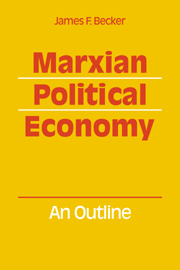Book contents
- Frontmatter
- Contents
- Acknowledgments
- Introduction
- PART ONE THE REPRODUCTION SCHEMES
- PART TWO THE LABOR THEORY OF VALUE
- PART THREE RELATIONSHIPS BETWEEN PRICES AND VALUES
- PART FOUR THE DEVELOPMENT OF CLASS STRUCTURE AND RELATIONSHIPS
- 10 Class structure and conflict in the managerial phase I
- 11 Class structure and conflict in the managerial phase II
- 12 Rotational employment and the transition to socialism
- Notes
- Index
10 - Class structure and conflict in the managerial phase I
Published online by Cambridge University Press: 07 October 2011
- Frontmatter
- Contents
- Acknowledgments
- Introduction
- PART ONE THE REPRODUCTION SCHEMES
- PART TWO THE LABOR THEORY OF VALUE
- PART THREE RELATIONSHIPS BETWEEN PRICES AND VALUES
- PART FOUR THE DEVELOPMENT OF CLASS STRUCTURE AND RELATIONSHIPS
- 10 Class structure and conflict in the managerial phase I
- 11 Class structure and conflict in the managerial phase II
- 12 Rotational employment and the transition to socialism
- Notes
- Index
Summary
Approaches to the study of power
Since Marx, and despite – or perhaps because? – his insistence that the truth is to be found elsewhere, the study of social power, its sources and its vagaries, has centered on what might be termed the “agencies” of power. In an effort to solve the riddle, scholars have identified and examined with care the trusts, gentlemen's agreements, combines, vertical and horizontal and mixed integrations, conglomerations, infrastructures and technostructures, national and international corporation alliances, governmental departments and bureaus, and combinatory arrangements among these. The more or less explicit aim has been to clarify the functioning of the whole by providing an answer to the old question, “Cui bono?”
In practice, however, agency studies have shied away from politically hazardous answers to the old query, often concluding with the intimation that we would all be better off were economic organization a bit more competitive. The study of agencies mean while continues, and while it has yielded much that it is important to know, it has had one unwonted effect. It has distracted investigators from certain other fundamental questions. By whom are the devices of power utilized? For whom? Are the agencies class agencies? If so, what is the nature of the class whose agencies these are? On the other side, who are the ruled? How do the agencies figure in the class struggle? While sharpening social tensions have recently given rise to fresh studies of class structure and function, relations between these two lines of research are not really intimate.
- Type
- Chapter
- Information
- Marxian Political EconomyAn outline, pp. 225 - 244Publisher: Cambridge University PressPrint publication year: 1977

